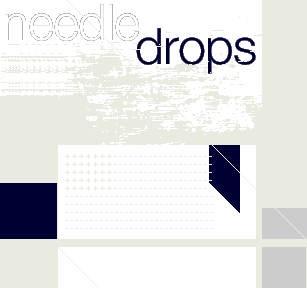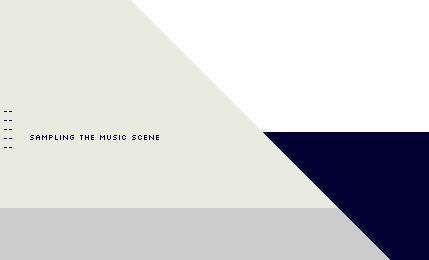


++ Contact Philip Sherburne ++
++ Recently ++
Tuesday, November 29, 2005 = The Stooges Unearthed (Again)
Tuesday, November 8, 2005 = Documenting Beulah And DCFC
Tuesday, November 1, 2005 = Out-Of-Control Rock 'N' Roll Is Alive And Well
Tuesday, October 25, 2005 = Just In Time For Halloween
Monday, October 3, 2005 = The Dandyesque Raunch Of Louis XI
Monday, August 15, 2005 = The Empire Blues
Tuesday, August 9, 2005 = David Howie's Sónar Diary
Monday, July 25, 2005 = Hot Sounds For Summertime
Monday, June 27, 2005 = Overcoming Writer's Block At Sónar 2005
Monday, June 4, 2005 = Cool New Sounds To Download Or Stream
++ Needle Drops Archives ++
View full list of Needle Drops articles...
|
|
 |
October 26, 2001
++ The Minimal Techno Sound Of Montreal
++ When I was in Montreal for the Festival International Nouveau Cinema Nouveau Médias (FCMM) last week, I did a radio interview for the University of Montreal's CISM. In the course of our conversation about electronic music and the magazines that cover it, the interviewer asked me about "the sound of San Francisco." Not an easy question — after all, in terms of electronic music alone, the Bay Area has one of North America's oldest drum-'n'-bass scenes, a varied house music community and a world-class hip-hop scene. Not to mention an experimental techno community that, in many ways, most closely echoes Montreal's own (and it's largely that community in Montreal that has become the focus of FCMM and MUTEK). The irony is that the fascination of both cities with minimal techno depends heavily upon a German aesthetic that both inspires and, at times, limits their own sounds. (Whereas it makes sense that Force Inc., the German minimal techno powerhouse, recently moved its North American office from New York to Montreal.)
As similar as the two cities' sounds are, one important difference separates them — for whatever reason, Montreal listeners seem to have much less interest in soul. Most of the DJs there play stripped-down, minimal techno, of either the straightforward, bangin' variety or the comparatively slinkier Perlon school; the deeper soul of classic Detroit techno or contemporary broken beat doesn't make much of an appearance. I all but cleared the floor with a set of funk-heavy West London breakbeat soul, and Safety Scissors commented a few nights later, as his aquamarine Moodymann selection faded out and another DJ threw down a platter of taut, melody-free syncopations, that he was surprised at the lack of response to his choice. "I don't think anyone here really has any Detroit records in their collections," he marveled.
Nevertheless, in an era when capitalism and the culture industry make Western cities more and more alike — The New Yorker's recent portrait of AOL Time Warner points out how media monopolies threaten local cultures and indigenous aesthetics — it's refreshing to discover that a city can indeed have its own sound and spirit. More than anything, Montreal seems to host almost boundless talent. Over my 11 days here, I heard some of the best DJs I've ever witnessed. Mike Shannon and Jeff Milligan (Algorithm), recent arrivals from Toronto, both possess an almost uncanny sense of pitch control — where some DJs take 16 bars to cue up a record before starting the mix, they drop the needle et voilà, it's on beat. If something slips, they tap the deck, and things are back in sync. I know this because I spent a few slack-jawed hours bent over the tables watching them at an after-hours party — not trainspotting, but holding down the table to keep it from jumping with the bouncing floorboards. (We initially tried cushioning the decks by putting flattened rolls of toilet paper underneath the turntables' feet, to no avail; someone finally fixed the problem by setting a plush, down pillow beneath each deck, inserted in mid-set with surgical precision. I never would have believed it could work, but it did: enterprising people, these Montreal types.)
There's no shortage of talented producers, either, and while they initially relied on a cottage industry of local labels to release their material, more and more Montreal artists are signing international deals: Jetone's Ultramarin is one of this year's best releases on Force Inc.; Akufen recently issued a 12-inch for Cologne's Kompakt affiliate Trapez, and has records forthcoming from both Cologne's Traum and Perlon. Mitchell Akiyama, with one CD out on Alien8 sublabel Subtractif, has a track on Silent's forthcoming ambient box set and is in talks with several German labels. Without even touching on Montreal's renowned electroacoustic community or the Godspeed-affiliated collectives, any of the following CDs should serve as a fine introduction to the sound of minimal Montreal.
++ Mitchell Akiyama, Hope That Lines Don't Cross (Subtractif): Toronto's Akiyama recently relocated to Montreal, part of an influx of Anglophone producers arriving in the city (interestingly, the electronic music community is one of Montreal's more integrated spaces). Hope That Lines Don't Cross puts him squarely in the post-Chain Reaction camp of Vladislav Delay: each track is a meditation on tone and color, taking a wash of clicks and subtle dub underpinning as its foundation, and riffing from there on all the permutations the sounds afford. The title may (at least for a hapless child of the '80s) recall Ghostbusters, but his liner notes reveal an interest in physics and space. As it turns out, Akiyama's multidisciplinary university studies took him not only through the familiar terrain of literature, philosophy and art history, but also into theoretical physics; without stretching the metaphor too much, you can hear in his recordings a meditation on gravity, energy and the question of space as mass vs. absence. A forthcoming recording, tentatively titled Broken Images and Packages of Folded Light, sees Akiyama building on this model, stressing haphazard rhythms and buried interior melodies, tracing a careful line between the spontaneity of improv and the pointed execution of the DJ.
(For those in the Bay Area, Akiyama makes his local debut on Wednesday, November 7 at Under The Radar; he'll also be broadcasting a live set on the Beta Lounge on Thursday, November 8, from 8 p.m. to midnight Pacific Time.)
++ Deadbeat, Primordia (Intr_version): No surprise that Scott Moneith's CD sounds much like Akiyama's, given that it appeared on Akiyama's own label. Muted, off-beat effects balance a softly thudding kick drum, hanging delicately in the balance between ambient music and techno. As in Akiyama's music, the pleasure here isn't to be derived from grandiose melodies, obvious embellishments, or extremity of any kind; listening to Deadbeat is like listening to your own thoughts unfurl, languorous and unhurried — and just as hard to hold onto, which only keeps you going back again and again.
++ Jetone, Ultramarin (Force Inc.): Tim Hecker's debut for Force Inc. treads similar territory as the above, but it benefits from the expanded tonal range that comes with better mastering. Jetone's sputter is choppier than Akiyama's or Deadbeat's, his beats more seasick, his inhalations more tentative. The steadfast thump of German minimal techno punches lovingly into the torn fabric of shortwave hiss and phonograph grain, a slo-mo boxing match turned to abstract choreography and sweat-streaked affect. Together, the three recordings add up to something like the sound of a genre imploding and rebuilding itself, one broken rib at a time.
++ I8U, B (Bake/Staalplaat): Like Goem or early Panasonic, I8U's music sculpts carefully shuddering rhythms out of the clash of waveforms and undulating bass tones. It's not quite repetition's endgame, but it comes close; as with Noto or Thomas Brinkmann, you have to listen close to hear the variations as overlapping loops twine out to seeming infinity. For all its simplicity, B charts strikingly original territory; each track impresses its signal firmly in your perception, elevating the mathematics of sound to a more abstracted poetry. Music like this, ideally, is meant to be heard in an enormous space on military-grade speakers, so that the room becomes its own instrument. But this CD still suggests a vast, cavernous expanse of sound.
++ DJ Maüs, Cream CD3 (Yul Records): It's only appropriate to include a mix CD or two in any survey of Montreal recordings; as I said above, Montreal is dominated by DJs whose styles reflect the city's own character. DJ Maüs — Louise Gavreau — opens her second mix CD with a minimal two-step track by Montreal's Orazio Fantini, but she quickly shifts into more characteristic mode with Pantytec's "Doubledip Uuh," from Germany's Perlon label. If there's one label that's most influenced Montreal's minimal techno scene, it's probably Perlon, known for chugging, pointillist microhouse, all grit and shudder and ping — indeed, Akufen, one of the city's most talented producers, was featured on Perlon's Superlongevity 2 compilation and will soon release a doublepack on the label.
When she DJs live, Maüs can favor storming club tracks, but here she sticks to subtler stuff from G.Pal (Plastic City) and B-Series (Poker Flat), stringing together a selection of syncopation-heavy tech-house tracks to create one long, flowing groove, tweaking the EQs to bring out hidden frequencies or bury a fading snare. The middle third favors harder techno's tribal rhythms (as on Telstar & Keum's Peace Division-like "Akcija"), but with Question's "7th Question," buzzing Detroit techno-jazz chords take things a little deeper, winding down with dubby German tech-house from Monika Kruse and T.P. Heckmann, and closing out with Christian Morgenstern's moody electro-techno. An energetic peak-hour mix from a talented selector.
++ Mightykat, Confidence (Haute Couture/Hautec): Dominique Thibault, like Maüs, is a resident DJ at Laika, a Montreal café where I whiled away many a mid-afternoon hour. Also, like some of the city's best DJs, she's a relatively new entrant to the field: the title, she told me, is intended specifically as a means of tackling her anxieties about playing and recording. Mightykat is the fuse to Maüs' cannon; where Maüs pummels, Mightykat sizzles, favoring delicate syncopations and the more minimal clickiness of microhouse. The Perlon crew again makes an appearance here, with Dimbiman's "Do the Dimbi" and Ricardo Villalobos' "Laser@Present." Confidence makes for a great introduction to some of Montreal's finer vinyl-only releases: Akufen contributes one track from Trapez and one from Montreal's Hautec, while Mike Shannon appears in springy, Wolfgang Voigt style with a track from Cynosure. And if you were looking for that Montreal-San Francisco connection, you can find it in the way Mightykat moves from Shannon to Twerk's glitchy, insectoid house, and then on into Akufen's swirling, Technicolor "Architextures (3)".
As the title might suggest, Confidence is something like a self-portrait, and the feeling comes across in the mix; you can hear Mightykat thinking her way through each transition, blocking together scraps of color like quilt pieces, even though the transitions flow on intuition alone. The CD might just be my favorite Montreal document, in fact — as warm and generous as the city itself, it also offers a portrait of the place as a meeting ground, where styles from the West Coast meet those from Western Europe, and the two create something intrinsically Montreal. And that, in the end, is what electronic music's global community is all about — the dialectic between the local and the global. I remember a night in Barcelona this summer, hanging out with Mightykat, and introducing her to the guys from the German label Festplatten. Incredible coincidence: Mightykat had just licensed a track from them for the mix; they'd emailed, but never met. Hugs abounded, and all proceeded down the street to hear yet another DJ, drink a cup of sangria and toast our good fortune. The world became one step smaller that evening, all thanks to a simple beat that spreads like a seedpod on global winds, shooting up in unique form everywhere it lands.
|
| |
|